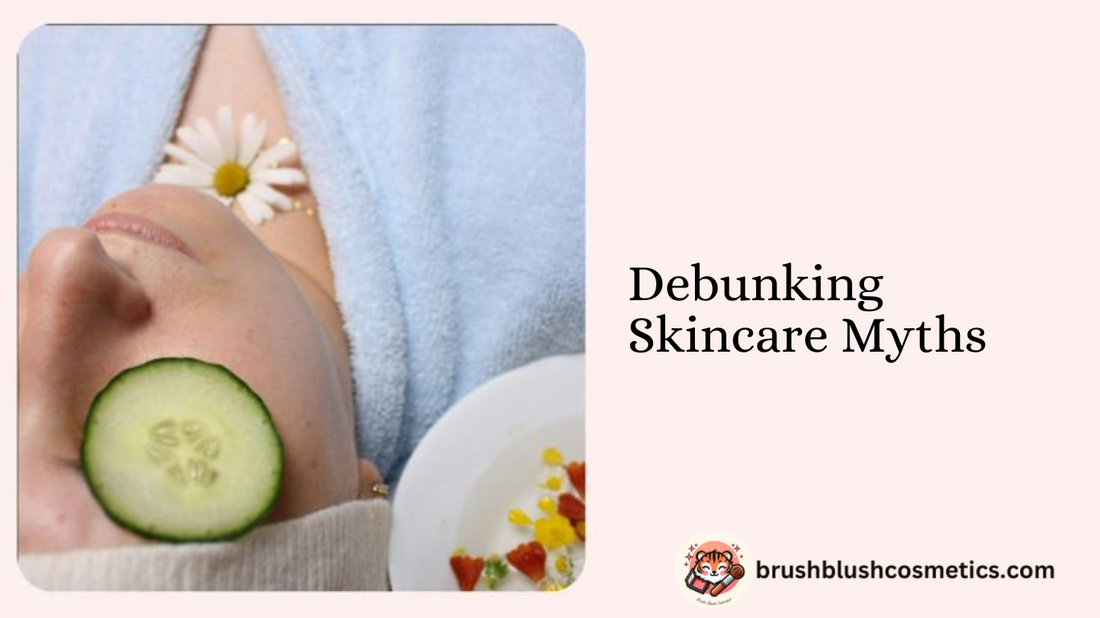
The world of skincare is full of myths and misconceptions. With so much information available online and passed through word of mouth, it can be challenging to separate fact from fiction. To help you make informed decisions about your skincare routine, we’re debunking some of the most common myths and revealing what actually works.
Myth 1: "Pores can open and close"
Truth: Pores don’t open and close like doors. They may appear larger when clogged with dirt, oil, and dead skin cells or when exposed to heat. Steam can help soften the debris inside the pores, making it easier to clean them, but it doesn’t physically open them. Similarly, cold water or toners may temporarily make pores look smaller by causing the surrounding skin to swell slightly, but they don’t close the pores. The size of your pores is primarily determined by genetics, although regular cleansing and exfoliation can help keep them clean and less noticeable.
Myth 2: "Higher SPF means you can stay in the sun longer"
Truth: While a higher SPF provides more protection against UVB rays, it doesn’t mean you can stay in the sun for extended periods without reapplying sunscreen. No sunscreen offers 100% protection, and all of them should be reapplied every two hours, especially after swimming, sweating, or towel-drying.
Myth 3: "Alcohol helps dry out acne"
Truth: Alcohol may temporarily dry out acne, but it also strips your skin of its natural oils, leading to irritation, dryness, and even more breakouts. It’s too harsh and can disrupt your skin’s natural barrier, which is essential for protection against environmental damage and bacteria. Instead, use products specifically formulated for acne treatment, such as those containing salicylic acid or benzoyl peroxide.
Myth 4: "Exfoliating your face will get rid of acne"
Truth: Over-exfoliating or scrubbing your face too harshly can actually worsen acne. It can irritate your skin, strip away its natural protective barrier, and trigger more breakouts. Instead, opt for a gentle exfoliant containing salicylic acid or benzoyl peroxide to help clear pores without causing irritation. Remember, less is more when it comes to acne treatment.

Myth 5: "You can get rid of dark circles just by getting more sleep"
Truth: While sleep can help reduce puffiness and improve overall skin health, dark circles are often caused by genetic factors, thinning skin, and hyperpigmentation—not just lack of rest. Other contributors include allergies, dehydration, and aging. Targeted treatments, such as eye creams with caffeine, vitamin C, or peptides, can help reduce their appearance.
Myth 6: "Your skin can become 'addicted' to lip balm"
Truth: Your lips can’t become "addicted" to lip balm. What people perceive as "addiction" is often due to using lip balms that contain irritating ingredients like menthol, camphor, or fragrances, which can cause a cycle of dryness and dependence. Choosing a lip balm with nourishing ingredients such as beeswax, shea butter, or petroleum jelly ensures long-lasting hydration without irritation.
Myth 7: "Anti-aging products are only necessary when you see wrinkles"
Truth: Anti-aging products can be beneficial long before wrinkles appear. Starting a skincare routine with antioxidants, sunscreen, and retinoids in your late 20s or early 30s can help prevent signs of aging. These ingredients protect the skin from environmental damage, boost collagen production, and maintain elasticity, slowing down the appearance of wrinkles.
Myth 8: "You don’t need sunscreen indoors"
Truth: Even when you’re indoors, UV rays can penetrate through windows and still cause skin damage, especially UVA rays, which contribute to premature aging. If you spend a lot of time near windows or in rooms with plenty of natural light, applying sunscreen daily is a good habit to protect your skin from potential UV exposure.
Myth 9: "Oily skin doesn’t need face oil or moisturizer"
Truth: Many people with oily skin avoid applying facial oils, thinking they will make their skin greasier. However, certain oils, like jojoba or grapeseed oil, can actually help regulate oil production and provide hydration without clogging pores.
Skipping moisturizer can also make your skin overcompensate by producing even more oil, leading to a greasy appearance and potential breakouts. It’s essential to choose the right moisturizer for oily skin—one that is lightweight, non-comedogenic, and formulated with hydrating ingredients like hyaluronic acid or glycerin.

Myth 10: "All wrinkles are caused by aging"
Truth: While aging is a major factor in wrinkle formation, many wrinkles result from sun exposure, smoking, dehydration, repetitive facial expressions, and other lifestyle factors. Preventative measures like wearing sunscreen, staying hydrated, and avoiding smoking can help reduce the formation of wrinkles.
Myth 11: "Anti-aging products are only for mature skin"
Truth: Prevention is key when it comes to anti-aging skincare. Starting a routine that includes ingredients like antioxidants, retinoids, or peptides in your late 20s or early 30s can help delay the appearance of fine lines and wrinkles. These ingredients also improve skin texture, tone, and overall health, making them beneficial for all ages.
Myth 12: "Expensive skincare products are more effective"
Truth: The effectiveness of skincare products depends on their ingredients and formulation, not their price tag. Many affordable skincare products contain the same active ingredients as their high-end counterparts. What matters most is finding products that suit your skin type and address your specific concerns—regardless of their cost.
Conclusion
Understanding what truly works in skincare can help you build a routine that is both effective and tailored to your needs. By debunking these common myths, we hope to provide clarity and guide you toward making informed decisions for your skin. Remember, skincare is personal, and what works for one person may not work for another. Always pay attention to how your skin reacts and consult a dermatologist if you have specific concerns. With the right information, you can achieve healthy, glowing skin.

2 comments
ggapaa
ggapaa